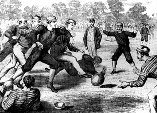
Did you know that mp3 aficionados can now attend “iPod U” by listening to lectures from university professors from, say, Stanford or MIT? This is called “coursecasting” and means you can shuffle from Shania Twain to “Nano-to-Macro Transport Processes” and then back to Shania Twain again! However, coursecasting demands considerably more mental energy, so it is more likely that the average, multitasking iPod shuffler will more often stick with Shania.
In the Sunday edition of the New Jersey Star-Ledger, this story was accompanied by another concerning iPods in the workplace. One psychologist lamented workers who seal themselves off in “auditory caves” by keeping music close to their ears at all times. On the other hand, an iWorker responded that “there’s IM-ing, e-mail, [and] people who literally walk over and tap you on the shoulder. There are so many ways people can get your attention, it’s a non-issue.”
Getting people’s attention is always an issue for preachers. Thus, I would like to put a plug in for "sermoncasting," or "wordcasting," as well. I frequently download sermons by Tim Keller, such as these. He is a favorite Bible teacher of mine and, incidentally, was discussed here in Sunday’s New York Times. Wordcasting is a good use of an iPod’s vaults of memory, in my opinion.
But back to the workplace. It is interesting how work and leisure are often combined in our lives today. We often have leisure time within our work (whether listening to music, checking email, or reading Bible in the Basement); and we often take work home with us, or even on vacation with us. Some people prefer to take work on vacation!
I do not believe it necessarily wrong to combine work and leisure, but this discussion leads me to ponder when it has gone too far. Consider these insights from Scripture:
“Whatever your hand finds to do, do it with your might.” (Ecclesiastes 9:10)
“So, whether you eat or drink, or whatever you do, do all to the glory of God.” (1 Corinthians 10:31)
We need to put ourselves into our activities enough that we can benefit from them, and that God can be glorified in them. We don’t want to live in a half baked world!




















